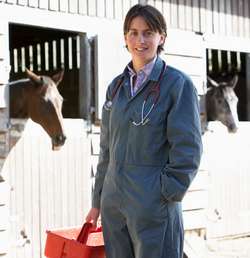~ Horses and Ponies – Vital Signs and Emergency Signs ~
It is important to know when your horse needs veterinary assistance.
If you have a horse or a stable, it is also highly advisable to have a well-equipped first aid kit readily available as you never know when you may need it to treat equines or humans.
VITAL SIGNS in Horses and Ponies:
Heart Rate: 35 – 45 beats/minute at rest. The heart rate can be determined by placing your hand, ear, or stethoscope on the left side of the chest. 60 beats/minute indicates a mild to moderate condition. 80 beats/minute or higher indicates a very severe condition and the vet should be brought in immedietely.
Temperature: 99 – 100 degrees Farenheit or 37.7 – 38.6 degrees Calcius. A digital human oral thermometer inserted into the rectum with a lubricant (vaseline) for one minute will obtain the temperature. Sudden rise in temperature is most often caused by a bacterial or viral infection. Overexertion or heat stroke will show a high fever.
Respiratory Rate: 10 – 15 breaths a minute at rest (noting one breath = one exhale and one inhale). This rate can be obtained by observing the rise and fall of the chest, or feeling the air pass in and out of the nostrils. The overall quality of the breathing is important too– is it sharp? ragged? shallow? noisy? normal? Elevated respiratory rate is often asociated with high fever or pain.
Signs of an Emergency Situation (Call the Vet Immediately)
- Dramatic rise or decrease of vital signs.
- Heavy bleeding — apply pressure.
- Difficulty breathing or choking.
- Straining to urinate or pass a bowel movement.
- Loss of balance or coordination/collapse.
- Inability to foal
- Severe injury — severe lameness, deep cut etc.
- Obvious Severe Pain — continuous rolling, sweaty flanks. Spasmodic pain.
- Poisoning
- Dehydration — a “pinch test” will determine if a horse is dehydrated. Pinch a bit of the horse’s skin on the neck and let go. The skin should immedietely resume it’s natural position. If the skin is lacking elasticity, your horse is dehydrated.
- Constipation
- Persistant cough.
